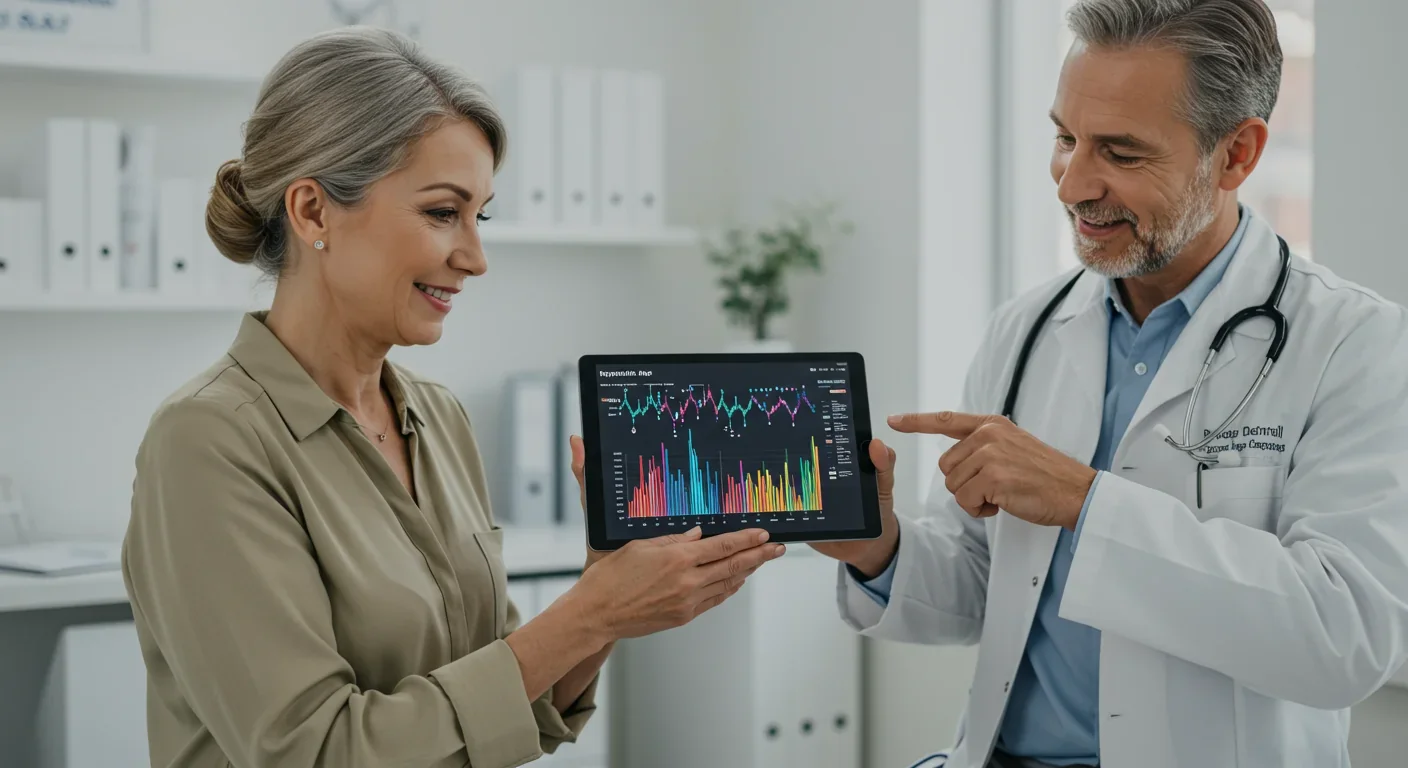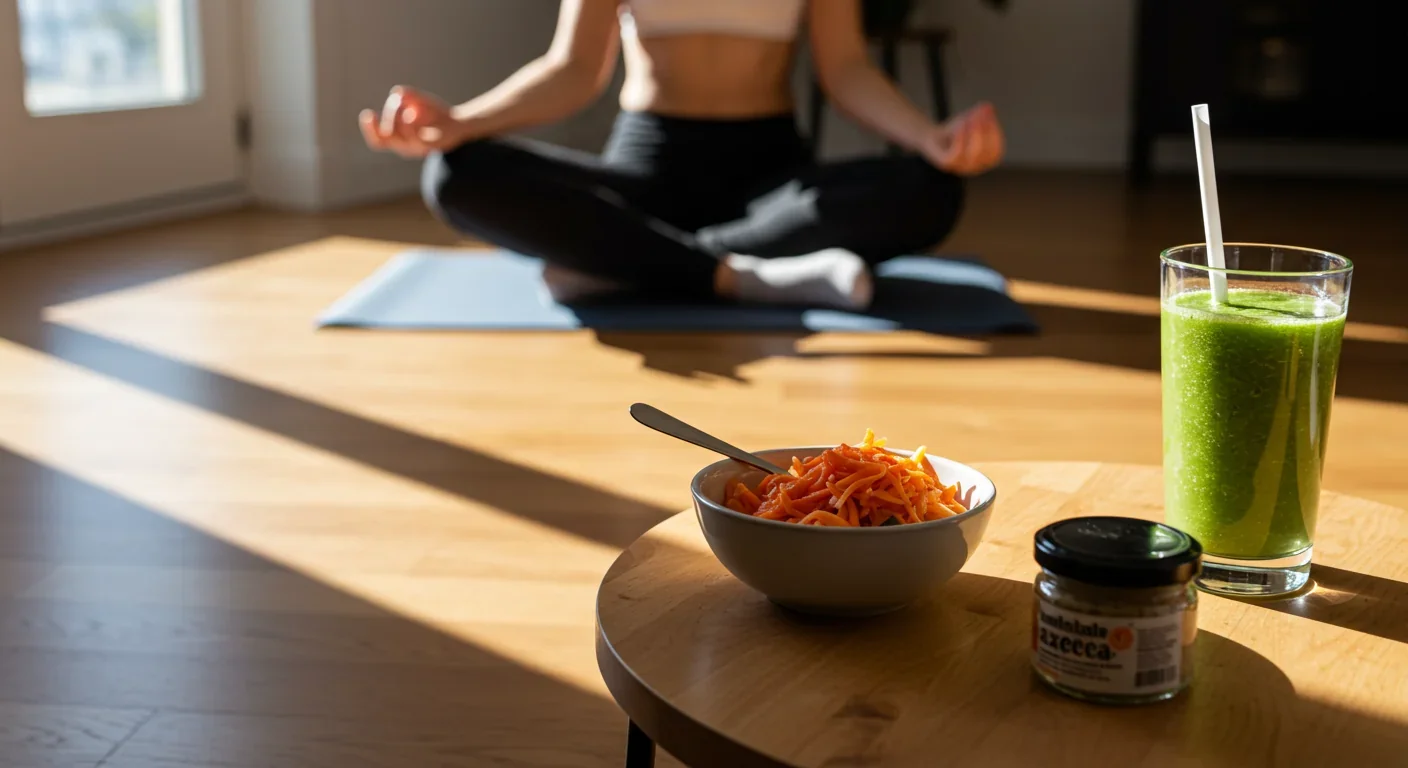Epigenetic Clocks Predict Disease 30 Years Early

TL;DR: Your gut microbiome produces neurotransmitters, communicates with your brain through the vagus nerve, and influences mental health. Diet changes, probiotics, and stress management can support gut-brain health, offering a new frontier in treating anxiety and depression.

Sarah tried everything. Therapy helped, but only a little. Meditation felt like trying to silence a hurricane with a whisper. The antidepressants dulled the edges of her anxiety but left her feeling disconnected. Then her doctor suggested something unexpected: probiotics and a diet overhaul. Within weeks, the fog began to lift. What changed? Not just her mind, but her gut.
The idea that your stomach influences your emotions sounds like pseudoscience, right up there with healing crystals and aura readings. But the science is real, extensive, and reshaping how we understand mental health. Your gut contains trillions of microorganisms that produce neurotransmitters, communicate with your brain through multiple pathways, and influence everything from anxiety to cognitive function. This isn't fringe medicine anymore. It's biology.
Your gut and brain are in constant conversation through what scientists call the gut-brain axis. This isn't metaphorical. It's a physical, chemical, and neurological highway with multiple lanes of traffic running in both directions.
The primary route is the vagus nerve, a massive nerve bundle that runs from your brainstem to your abdomen. This nerve carries signals bidirectionally, transmitting information about gut conditions to your brain and vice versa. When researchers cut this nerve in animal studies, the behavioral effects of gut microbiome changes vanish, proving the connection is real and direct.
But the vagus nerve isn't working alone. Your gut microbes produce an astonishing array of neurochemicals. More than 90% of your body's serotonin is manufactured in your gut, primarily by specialized cells in the intestinal lining. The same bacteria produce gamma-aminobutyric acid (GABA), the brain's primary calming neurotransmitter, plus dopamine, norepinephrine, and acetylcholine.
Think about that for a moment. The microorganisms in your intestines are producing the same chemicals that pharmaceutical companies spend billions trying to modulate with drugs. These aren't trace amounts either. Studies using germ-free mice show that animals without gut microbiomes have drastically different brain chemistry, altered stress responses, and behavioral changes that reverse when normal gut bacteria are reintroduced.
The third communication pathway involves your immune system. About 70% of your immune cells live in your gut, where they constantly sample the microbial population. When that population shifts toward harmful species, immune cells respond with inflammation. Some of those activated immune cells migrate to the brain, where they can trigger or worsen conditions like depression and anxiety.
Finally, gut bacteria influence your brain through metabolites. They break down fiber into short-chain fatty acids like butyrate, which strengthens the gut lining and reduces systemic inflammation. They produce other compounds that can cross into the bloodstream, eventually reaching the brain and modulating neurotransmitter receptors.
The science started with surprising observations. Japanese researchers noticed that germ-free mice raised without any gut bacteria showed exaggerated stress responses. When the mice were exposed to mild stressors that normal mice shrugged off, the germ-free animals produced excessive stress hormones and exhibited anxiety behaviors.
Then came the probiotic studies. In one landmark experiment, mice fed Lactobacillus rhamnosus showed reduced anxiety-like behavior and lower stress hormone levels. More importantly, their brains showed changes in GABA receptor expression in regions involved in emotional regulation. When researchers severed the vagus nerve, these effects disappeared, proving the gut-brain connection was responsible.
The human studies followed. A 2019 meta-analysis examining over 1,000 participants found that probiotic supplementation significantly reduced symptoms of depression. The effect sizes weren't enormous, but they were comparable to some pharmaceutical interventions and came with virtually no side effects.
More recent research has connected specific bacterial strains to specific mental health outcomes. People with depression tend to have lower levels of Faecalibacterium and Coprococcus bacteria, both of which produce butyrate. Those with anxiety disorders often show reduced microbial diversity and elevated populations of inflammation-promoting species.
The fecal transplant studies pushed the evidence even further. When researchers transferred gut microbiomes from depressed patients into germ-free mice, those mice developed depression-like behaviors. Transfer microbiomes from healthy individuals, and the mice remained behaviorally normal. The implication is stark: the microbiome isn't just correlated with mental health, it's causally involved.

Let's get specific about mechanisms, because understanding the "how" makes the connection less magical and more actionable.
When you eat fiber, certain gut bacteria ferment it into short-chain fatty acids. Butyrate, one of the most important, serves as fuel for cells lining your colon. But it also influences gene expression in the brain, promoting the production of brain-derived neurotrophic factor (BDNF). BDNF is essentially fertilizer for neurons, helping them grow, connect, and survive. Depression is associated with reduced BDNF levels.
Your gut bacteria also regulate tryptophan metabolism. Tryptophan is the amino acid precursor to serotonin, and your microbiome controls which pathway it gets shunted down. A healthy microbiome directs tryptophan toward serotonin production. A dysbiotic microbiome pushes it toward kynurenine, a metabolite that promotes inflammation and is elevated in people with depression.
The blood-brain barrier, which normally protects your brain from harmful substances, can be compromised by gut inflammation. When gut bacteria produce endotoxins called lipopolysaccharides, these can increase intestinal permeability, allowing inflammatory molecules into the bloodstream. Once circulating, they can signal the brain to initiate a stress response, even when no external threat exists.
Stress itself creates a vicious cycle. When you're anxious or depressed, your body produces cortisol, which alters gut motility and changes the intestinal environment. This favors the growth of harmful bacteria over beneficial species. The dysbiosis worsens inflammation, which feeds back to worsen mood. Breaking this cycle requires intervention on both ends: treating the mental state and repairing the microbiome.
If gut bacteria influence mood, and diet influences gut bacteria, then diet should influence mood. That's exactly what the data shows.
The Mediterranean diet, rich in vegetables, fruits, whole grains, fish, and olive oil, consistently correlates with lower rates of depression across multiple population studies. Is it the omega-3 fatty acids in fish? The polyphenols in olive oil? The fiber feeding beneficial bacteria? Probably all of it, working synergistically.
A landmark randomized controlled trial called the SMILES study put the diet hypothesis to the test. Researchers assigned people with moderate to severe depression to either receive dietary counseling focused on Mediterranean-style eating or social support sessions. After 12 weeks, one-third of the diet group achieved remission from depression, compared to only 8% in the control group.
The key seems to be feeding the bacteria that produce beneficial metabolites. That means fiber, and lots of it. Most Americans consume 10-15 grams of fiber daily. The recommended amount is 25-35 grams. The difference matters because fiber-fermenting bacteria like Bifidobacterium and Lactobacillus produce the short-chain fatty acids that reduce inflammation and support brain health.
Prebiotics, specific types of fiber that selectively feed beneficial bacteria, show particular promise. Inulin, found in chicory root, garlic, and onions, increases populations of Bifidobacterium species. Resistant starch, present in cooked and cooled potatoes or green bananas, feeds butyrate-producing bacteria. Human studies show that prebiotic supplementation can reduce cortisol levels and improve emotional processing.
Fermented foods provide another avenue. Yogurt, kefir, sauerkraut, kimchi, and kombucha contain live bacteria that can transiently colonize the gut. Regular consumption of fermented foods increases microbial diversity, a marker consistently associated with better mental health outcomes. In one study, people who ate fermented foods daily for four weeks showed reduced social anxiety.
Conversely, ultra-processed foods damage the microbiome. Emulsifiers, artificial sweeteners, and other additives can reduce bacterial diversity and promote inflammation. High-sugar, high-fat diets favor bacterial species that produce inflammatory compounds. Observational studies consistently find that people consuming Western-style diets have higher rates of depression and anxiety.
Not all probiotics affect mental health. The term "psychobiotic" was coined to describe specific bacterial strains with demonstrated effects on mood, cognition, or stress response.
Lactobacillus rhamnosus and Bifidobacterium longum are the most studied psychobiotics. In human trials, Bifidobacterium longum reduced depression scores and altered brain activity patterns visible on functional MRI scans. Lactobacillus helveticus combined with Bifidobacterium longum decreased anxiety and reduced cortisol in stressed adults.
The effects aren't always huge. A person with severe clinical depression won't find complete relief from a probiotic capsule. But as an adjunct to other treatments, or for people with mild to moderate symptoms, the evidence suggests real benefits with minimal risk.
Dosing matters. Most successful studies used 10-100 billion colony-forming units daily, taken consistently for at least four weeks. Effects often build gradually and may fade if supplementation stops, suggesting that probiotics modify the gut environment rather than permanently colonizing it.
Prebiotics might be even more powerful because they feed the beneficial bacteria already living in your gut. Rather than introducing new organisms that may or may not survive the journey through stomach acid, prebiotics nourish your existing microbiome. Studies show that prebiotic supplementation improves sleep quality, reduces anxiety, and lowers inflammatory markers.

The gut-brain connection is real, but it's also become a magnet for exaggerated claims and miracle cures.
Myth: A probiotic supplement can cure depression. Reality: Probiotics may help reduce depressive symptoms, particularly when combined with other treatments, but they're not standalone cures. Depression is multifactorial, involving genetics, life circumstances, and brain chemistry. Probiotics address one piece of a complex puzzle.
Myth: You need expensive supplements to improve your gut health. Reality: Whole foods work just as well, if not better. A diet rich in fiber and fermented foods provides the raw materials and beneficial bacteria your gut needs. Supplements can be convenient, but they're not necessary for most people.
Myth: All gut bacteria are either good or bad. Reality: It's about balance and diversity. Some bacteria labeled as "bad" are harmless or even beneficial in small amounts. Problems arise when populations become unbalanced or when beneficial species are depleted. Microbial diversity is a better predictor of health than the presence or absence of specific species.
Myth: A single course of antibiotics will permanently destroy your microbiome. Reality: Antibiotics do reduce bacterial diversity and can shift populations toward less favorable compositions. However, most microbiomes recover within weeks to months, especially with dietary support. That said, unnecessary antibiotic use should still be avoided.
Myth: Everyone should take the same probiotics. Reality: Your microbiome is unique, influenced by genetics, early life exposures, diet, and environment. What works for one person may not work for another. Personalized approaches, guided by microbiome testing or symptom tracking, are more effective than one-size-fits-all recommendations.
Want to support the gut-brain axis? Here's what the evidence suggests actually works.
Eat more fiber: Aim for 25-35 grams daily from vegetables, fruits, legumes, and whole grains. Diverse fiber sources feed different bacterial species, promoting overall diversity.
Include fermented foods: Yogurt, kefir, sauerkraut, kimchi, miso, and kombucha all provide live bacteria. Daily consumption, even in small amounts, makes a difference.
Limit processed foods: Ultra-processed foods with emulsifiers, artificial sweeteners, and excessive sugar can disrupt the microbiome. Focus on whole foods whenever possible.
Consider a psychobiotic supplement: If you're dealing with mild anxiety or depression, a probiotic containing Lactobacillus rhamnosus or Bifidobacterium longum might help. Look for products with 10-100 billion CFUs and take consistently for at least a month.
Manage stress: Chronic stress damages the microbiome, creating a negative feedback loop. Practices like meditation, exercise, and adequate sleep protect gut health, which in turn supports mental resilience.
Move your body: Exercise increases microbial diversity and promotes the growth of butyrate-producing bacteria. Even moderate physical activity shows measurable microbiome benefits.
Be cautious with antibiotics: Use them when medically necessary, but avoid them for viral infections or minor ailments. If you do take antibiotics, support recovery with probiotic-rich foods during and after treatment.
Get enough polyphenols: Found in colorful fruits, vegetables, tea, coffee, and dark chocolate, polyphenols feed beneficial bacteria and have direct anti-inflammatory effects. The Mediterranean diet is naturally rich in these compounds.
The next decade will see gut-brain interventions move from the edges to the mainstream of mental health care. Researchers are identifying bacterial strains with increasingly specific effects. Some produce particular neurotransmitters. Others modulate inflammation in precise ways. Future treatments might involve designer probiotics engineered to address specific conditions.
Fecal microbiota transplantation (FMT), already used to treat recurrent C. difficile infections, is being tested for depression and anxiety. Early case reports show promising results, but large-scale trials are needed. The idea of treating mental illness with someone else's stool is admittedly strange, but if it works, the mechanism matters more than the aesthetics.
Personalized microbiome interventions are another frontier. Microbiome testing is becoming cheaper and more accessible. In the future, you might analyze your gut bacteria and receive tailored recommendations for specific foods, prebiotics, or probiotics that address your unique microbial deficits.
Researchers are also exploring the microbiome's role in other mental health conditions beyond depression and anxiety. Preliminary studies link gut dysbiosis to autism spectrum disorders, schizophrenia, and bipolar disorder. While causality remains unclear, the gut-brain axis represents a new therapeutic target that doesn't require crossing the blood-brain barrier.
The pharmaceutical industry is paying attention. Several biotech companies are developing psychobiotics through rigorous clinical trials, seeking FDA approval for specific mental health indications. These won't be generic probiotic supplements. They'll be precisely formulated bacterial consortia or purified bacterial metabolites, prescribed like any other psychiatric medication.
The gut-brain connection challenges the artificial separation between mind and body that has dominated Western medicine for centuries. Your brain doesn't exist in isolation. It's part of an integrated system that includes your immune cells, your gut bacteria, and the food you eat.
This realization is both humbling and empowering. Humbling because it reveals how much we don't control. Empowering because it offers new levers to pull. You can't directly change your neurotransmitter levels, but you can change what you eat. You can't rewire your brain through willpower alone, but you can nurture the bacteria that influence how your brain functions.
For Sarah, the woman whose story opened this article, understanding the gut-brain connection was transformative. Not because it provided an instant cure, but because it gave her agency. She couldn't force her brain to stop being anxious, but she could feed her body in ways that supported mental health. She couldn't control her neurotransmitters, but she could create an internal environment where the right bacteria thrived.
The science is clear: your gut and your brain are partners in a complex dance. When the partnership works well, you feel balanced, resilient, and clear-headed. When it breaks down, both suffer. The good news? You have more influence over this partnership than you might think. Every meal is an opportunity to support it. Every choice to reduce stress or increase movement is an investment in your mental health at a cellular level.
The future of psychiatry won't abandon pharmaceutical interventions or psychotherapy. But it will expand to include the microbiome as a legitimate, evidence-based target. We're standing at the beginning of a new era in mental health treatment, one that recognizes the profound connection between what's happening in your gut and what's happening in your mind.

Recent breakthroughs in fusion technology—including 351,000-gauss magnetic fields, AI-driven plasma diagnostics, and net energy gain at the National Ignition Facility—are transforming fusion propulsion from science fiction to engineering frontier. Scientists now have a realistic pathway to accelerate spacecraft to 10% of light speed, enabling a 43-year journey to Alpha Centauri. While challenges remain in miniaturization, neutron management, and sustained operation, the physics barriers have ...

Epigenetic clocks measure DNA methylation patterns to calculate biological age, which predicts disease risk up to 30 years before symptoms appear. Landmark studies show that accelerated epigenetic aging forecasts cardiovascular disease, diabetes, and neurodegeneration with remarkable accuracy. Lifestyle interventions—Mediterranean diet, structured exercise, quality sleep, stress management—can measurably reverse biological aging, reducing epigenetic age by 1-2 years within months. Commercial ...

Data centers consumed 415 terawatt-hours of electricity in 2024 and will nearly double that by 2030, driven by AI's insatiable energy appetite. Despite tech giants' renewable pledges, actual emissions are up to 662% higher than reported due to accounting loopholes. A digital pollution tax—similar to Europe's carbon border tariff—could finally force the industry to invest in efficiency technologies like liquid cooling, waste heat recovery, and time-matched renewable power, transforming volunta...

Humans are hardwired to see invisible agents—gods, ghosts, conspiracies—thanks to the Hyperactive Agency Detection Device (HADD), an evolutionary survival mechanism that favored false alarms over fatal misses. This cognitive bias, rooted in brain regions like the temporoparietal junction and medial prefrontal cortex, generates religious beliefs, animistic worldviews, and conspiracy theories across all cultures. Understanding HADD doesn't eliminate belief, but it helps us recognize when our pa...

The bombardier beetle has perfected a chemical defense system that human engineers are still trying to replicate: a two-chamber micro-combustion engine that mixes hydroquinone and hydrogen peroxide to create explosive 100°C sprays at up to 500 pulses per second, aimed with 270-degree precision. This tiny insect's biochemical marvel is inspiring revolutionary technologies in aerospace propulsion, pharmaceutical delivery, and fire suppression. By 2030, beetle-inspired systems could position sat...

The U.S. faces a catastrophic care worker shortage driven by poverty-level wages, overwhelming burnout, and systemic undervaluation. With 99% of nursing homes hiring and 9.7 million openings projected by 2034, the crisis threatens patient safety, family stability, and economic productivity. Evidence-based solutions—wage reforms, streamlined training, technology integration, and policy enforcement—exist and work, but require sustained political will and cultural recognition that caregiving is ...

Every major AI model was trained on copyrighted text scraped without permission, triggering billion-dollar lawsuits and forcing a reckoning between innovation and creator rights. The future depends on finding balance between transformative AI development and fair compensation for the people whose work fuels it.